What does 'controlling our borders' really mean?
- Published
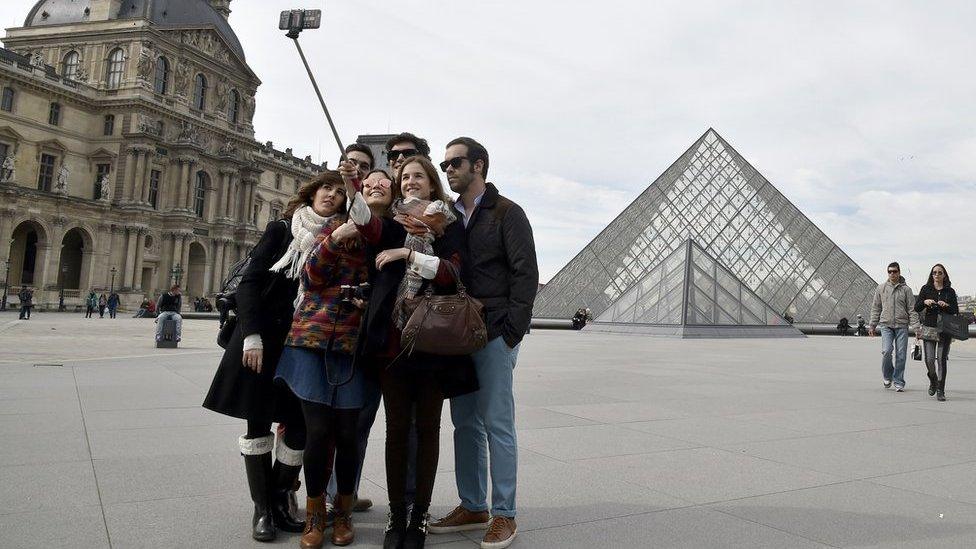
Would Brits need a visa to make a trip across the Channel in the event of Brexit?
If we leave the European Union would you need a visa to go on holiday to France? Or need a permit to work in Germany? Both might sound far-fetched but they are possible outcomes of the perceived need to curb migration.
The desire of many voters to "control our borders" might be the Leave campaign's strongest suit. It is a fact that the UK cannot exclude workers from most of Europe while in the European Union. "Control our borders", external is a clear slogan. But details of what it might mean in practice are, to say the least, extremely sketchy.
It is not only central to this debate - it is the very reason we are having it. Granting a referendum was an electoral tactic and party management ploy by David Cameron to deal with discontent on his backbenches and the rise of UKIP.
There is broad agreement that their success in the European elections in 2014, external was fuelled, not by a sudden surge of concern about sovereignty, but by worries about the huge influx of immigration from Poland and the rest of Eastern Europe.
The vote we are about to have was intended to steal UKIP's thunder, and to an extent it worked.
It also means we have never really had the argument about whether European migration is really such a bad thing. More on that later.
But I want to explore what controlling our borders really means.
Tall order
One of the frustrating things about covering this referendum is that no one needs to back up their binary choice with policies. In a general election it would be very odd if a party stood on a platform of "control our borders" and didn't feel the need to say how that would be achieved.
But while Boris and Michael and Nigel and Gisela all agree we should leave the EU - they don't have to agree on what that means for immigration policy, let alone design a system that might work.
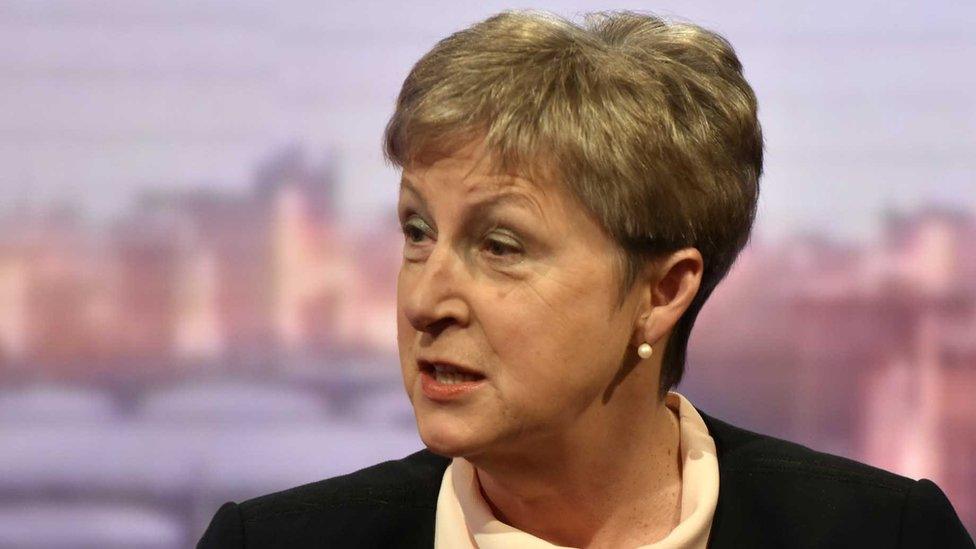
Vote Leave co-chairman Gisela Stuart is one of a small group of Labour MPs opposed to Britain's membership of the EU
But it is fair to assume a Leave vote would mean the electorate wanted tighter controls.
To put it bluntly, the logic of what has been said suggests young unskilled workers from Eastern Europe would be stopped from coming here in such numbers.
Given the failure of the government to meet its own targets, external for immigration from outside the EU - where we do "control our borders" - it might be a tall order.
There are likely to be sacrifices. Although nothing is certain, such controls would seem to rule out staying in the single market, or the European Economic Area., external.
Of course they might want our trade so badly they rip up the rule book. That is what Mr Cameron blithely assumed when he went to negotiate an emergency brake on EU migration for the UK. He found that free movement of workers was a thick red line. Switzerland, a member of the EEA, is currently having a big argument about the same issue, external.
If the rest of Europe's leaders wouldn't give way to allow Mr Cameron a stronger argument to stay in, they are unlikely to grant a bigger concession for a prime minister who wants to leave the club.
New visas?
UKIP at least do have a detailed policy, external. They would establish a visa system, based on the Australian points system, external. Oh and European citizens would no longer get priority at passport control - they'd have to join the queue that says "all other passports".
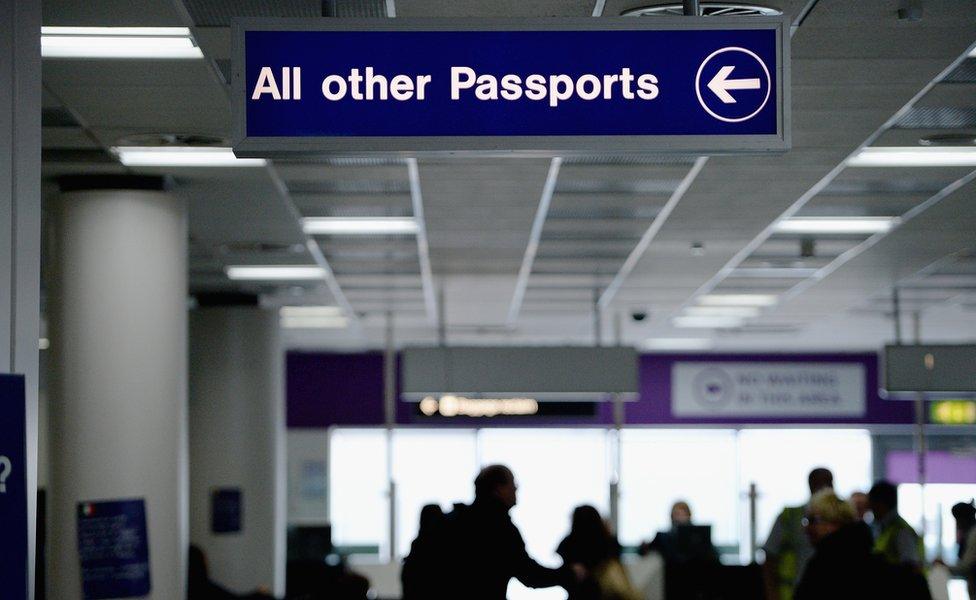
Could EU citizens soon have to join this queue?
Boris Johnson, before the campaign began, seemed to endorse something similar, saying, external: "It should be up to us in this country to decide - as they do in America and Australia - whom to admit and when to admit them."
Michael Gove has backed it more recently, external.
It is not clear to me if they expect these planned visas to apply just to potential workers, or to tourists too.
The Australian system does require everyone to get a visa - although for European tourists it is a simple online process.
If it were to apply just to workers we'd need to hear more about how you stop those who say they're coming for a quick weekend break, but really want to stay and work.
But there's certainly a precedent - tourists from Japan and New Zealand do not need a visa to come here, but might do, perhaps, maybe for work.
The rules, external are hardly set in stone.
If you come from Nigeria, India or Vietnam, for example, you need a visa to come here full stop.

If Britain votes to leave, would tourists from the EU be treated like those from Japan or from India?
If we left, would Poles be treated like Japanese or Indians?
We don't know - but this whole business seems an awful lot of bother to go to, just to establish a theoretical right to bar people, if it had no practical application.
New work permits?
New work permits is another possibility.
Migration Watch, which wants to curb migration, also sets out a detailed plan, external. "The key change should be the introduction by the UK of work permits to restrict the right for all foreign citizens, including EU citizens, to work in Britain... The EU would, of course, be likely to reciprocate."
It goes on: "There is no reason, however, why EU citizens should not still be able to make visits to the UK for business or tourism without the need for visas."
The point is that if there is a real desire to stop Europeans working in the UK there has to be a moment at which someone says either "you can't come in, matey" or "you shouldn't be working here".
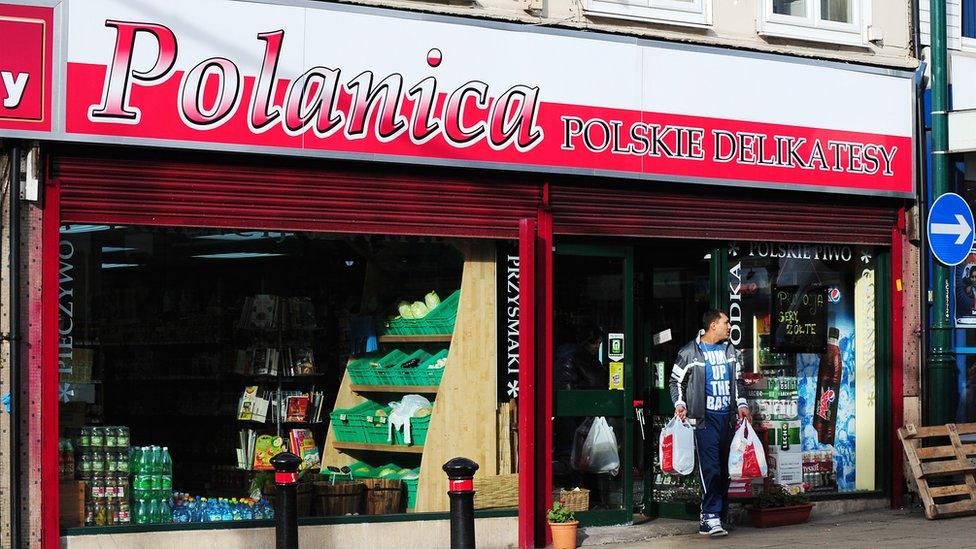
Increased immigration from Eastern Europe is widely believed to be behind UKIP's success in the 2014 European elections
It is fair to assume any country that was subject to new controls, work permits or visas would make British citizens go though the same process. But if we restricted, say Latvians and Lithuanians, would Germany and France respond in a like manner?
In this case it would be one for all and all for one. The European Commission's website states, external: "The border-free Schengen Area cannot function efficiently without a common visa policy." So if we needed visas for one country, we'd need them for all EU states.
Dominic Raab was widely portrayed as the first Conservative Leave campaigner to explicitly accept the logic that this would mean visas for them - and us, external after an interview on the Sunday Politics.
But he tells me he did nothing of the kind: "I cited the US review of certain EU countries after the Brussels and Paris attacks, and the fact that they may introduce visa requirements or screening for some. I made the point that - as a security measure - they could impose security checks, and we should be able to do the same. The idea that this would lead to wholesale visa applications for every visit to the EU is ludicrous, given the options for automatic visas or visa waiver."
Migration debate
But all this begs a bigger question. All those who advocate a points system do so as a way of allowing skilled migrants in, while stopping unskilled ones.
There's a fair amount of research to suggest that people are disturbed by the scale of migration from Europe - but there's also an argument it is no bad thing.
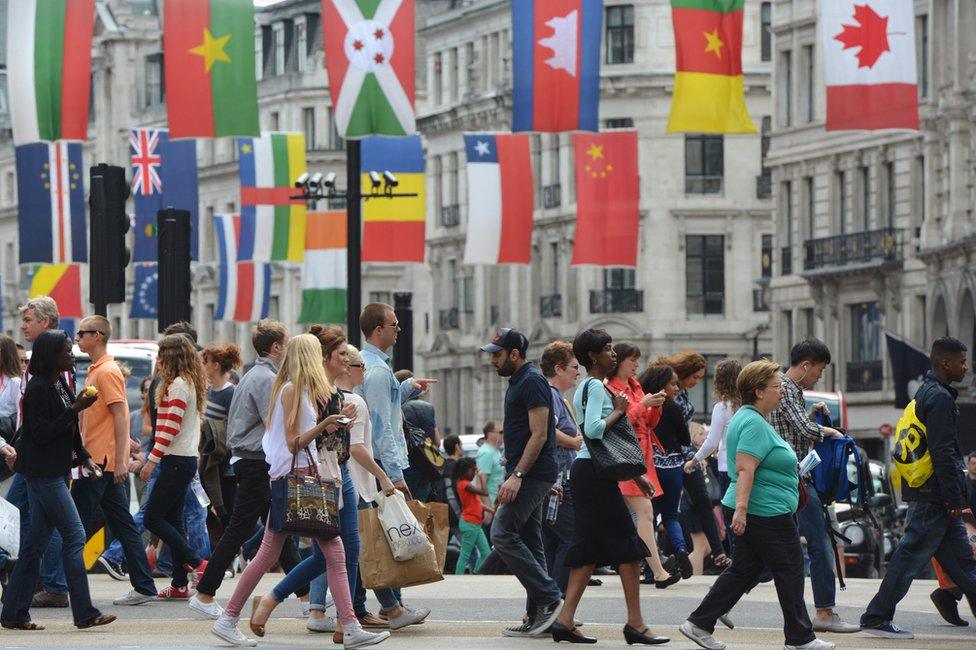
There are no certainties in the migration debate
Open Europe, which is neutral in the referendum campaign, also recommends an Australian-style points system, external. But the group argues the UK's high employment rate and ageing demographics mean: "While there would be political pressure to reduce immigration following Brexit, there are several reasons why we believe headline net immigration is unlikely to reduce much."
A new study by the National Institute of Economic and Social Research, external (Niesr) goes further. It warns that a halt to unskilled EU migration would have "significant and damaging effects" on many British businesses, adding "such is the dependence of some employers on EU migrants that one brewery and hotel manager said he would simply 'panic'".
Niesr director Heather Rolfe has written an interesting blog, external suggesting they could use younger or older British workers, or simply pay more.
But the survey "revealed the frustrations employers experience attracting British workers to low-skilled jobs, and found there were few viable alternatives to EU migrants. UK-born older workers and students had disadvantages in terms of their availability and suitability for the work required, while non-EU migrants were often over-qualified and their recruitment costly and time-consuming because of visa applications."
Others, like Migration Watch, suggest it would have a negligible impact on the economy and a beneficial one for British workers.
We've learnt by now there are no certainties in this debate, but migration is one area where there are a lot of shouty headlines, and an absence of detail.
We hope to have more on The World This Weekend on Radio Four on Sunday.